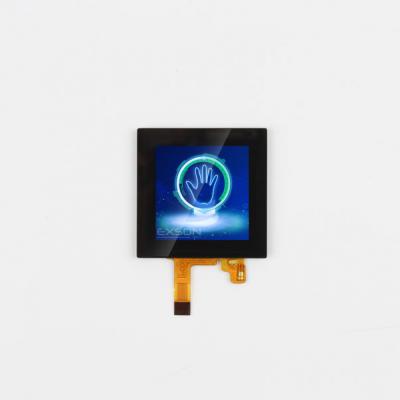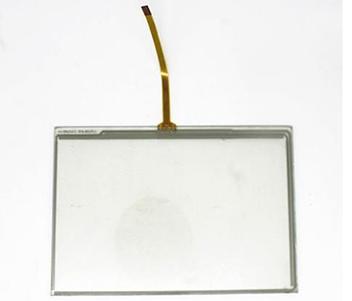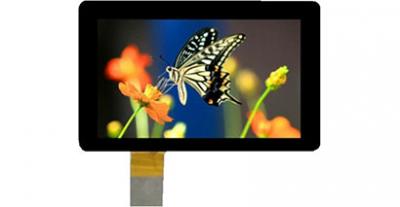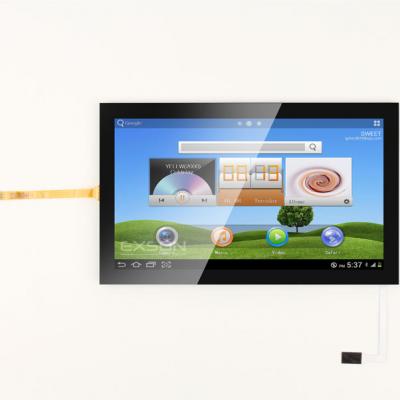There are many types of touch screens on the market, and the more common ones are resistive touch screen (RTP), capacitive touch screen (CTP), surface acoustic wave touch screen, and infrared touch screen. At present, the most widely used touch screens mainly include capacitive touch and resistive touch. The following is a simple comparison of the main differences between the two touch technologies.
1. Capacitive touch: It uses the current induction of the human body to work. When a finger touches the metal layer, due to the electric field of the human body, the user and the surface of the touch screen form a coupling capacitance. For high-frequency currents, the capacitance is a direct conductor, so the finger absorbs a small current from the contact point. This current flows out of the electrodes on the four corners of the touch screen respectively, and the current flowing through these four electrodes is proportional to the distance from the finger to the four corners. The controller obtains the position of the touch point through accurate calculation of the four current ratios.
2. Resistive touch: It mainly realizes the operation and control of the screen content through the principle of pressure sensing. The body part of this touch screen is a multi-layer composite film that is very compatible with the surface of the display. When the surface layer is pressed down lightly, it touches the bottom layer. The controller simultaneously reads the corresponding current from the four corners and calculates the distance of the finger position.
1. Capacitive screen: support multi-touch, fast response, responsive.
2. Resistive screen: pressure sensitive, any object can be used for touch.
1. Capacitive screen: It is easily affected by changes in environmental temperature, humidity, electric field and other factors. However, we industrial LCD display manufacturers can optimize the display screen according to the usage scenario.
2. Resistive screen: The screen is not easily affected by dust, water vapor and oil, and can be used in a lower or higher temperature environment, and can adapt to harsh environments.
1. Capacitive screen: Compared with the resistive touch technology, the cost is higher.
2. Resistive screen: Since the technology of capacitive touchscreen display is very mature, and the structure is simple, the technical threshold is low, so the resistive touch screen cost is low.
1. Capacitive touch screen: Capacitive touch technology uses current induction to work, which has little wear on the screen and long service life.
2. Resistive screen: Resistive touch technology uses pressure sensing, which is easy to wear and tear the screen, resulting in impaired touch function and short service life.
 Analysis of LCD SPI Screen Flicker PhenomenonMay 26, 2023When we use display devices such as mobile phones, car displays, and home appliances, do we sometimes feel that there are lines scrolling up and down on the screen? Sometimes the screen even flickers?...view
Analysis of LCD SPI Screen Flicker PhenomenonMay 26, 2023When we use display devices such as mobile phones, car displays, and home appliances, do we sometimes feel that there are lines scrolling up and down on the screen? Sometimes the screen even flickers?...view What Are the Advantages of Resistive Touch Screen?February 8, 2023Resistive touch screens were first invented in 1971 by Dr. Samuel G. Hurst. He calls the sensor the Elograph, after his company, Elographics.Ⅰ. What is a resistive touch screen?As the name suggests, ...view
What Are the Advantages of Resistive Touch Screen?February 8, 2023Resistive touch screens were first invented in 1971 by Dr. Samuel G. Hurst. He calls the sensor the Elograph, after his company, Elographics.Ⅰ. What is a resistive touch screen?As the name suggests, ...view Exploring the Different Types and Remarkable Features of Touch Panel ModulesJanuary 25, 2024In today's tech-savvy world, touch screen technology has become an integral part of our daily lives. From smartphones and tablets to smart appliances, touch panel modules enhance the user experien...view
Exploring the Different Types and Remarkable Features of Touch Panel ModulesJanuary 25, 2024In today's tech-savvy world, touch screen technology has become an integral part of our daily lives. From smartphones and tablets to smart appliances, touch panel modules enhance the user experien...view Characteristics and Advantages of LCD Bar-type LCD ScreensAugust 4, 2023The technology of LCD liquid crystal displays is developing rapidly, and LCD bar-type LCD screens are currently popular new products in the market. So what is a bar-type LCD screen?An LCD bar-type LCD...view
Characteristics and Advantages of LCD Bar-type LCD ScreensAugust 4, 2023The technology of LCD liquid crystal displays is developing rapidly, and LCD bar-type LCD screens are currently popular new products in the market. So what is a bar-type LCD screen?An LCD bar-type LCD...view How the TFT display worksDecember 9, 20221. How does TFT display work?How does TFT display work? TFT is the abbreviation of Thin Film Transistor, which generally refers to thin film liquid crystal display, but actually refers to ...view
How the TFT display worksDecember 9, 20221. How does TFT display work?How does TFT display work? TFT is the abbreviation of Thin Film Transistor, which generally refers to thin film liquid crystal display, but actually refers to ...view The Difference between OLED and TFT DisplaysDecember 9, 2022OLED is one of the hottest concepts in the current display industry, and OLED itself has many advantages. For another concept in the real industry - TFT, perhaps not so many people know about it. Toda...view
The Difference between OLED and TFT DisplaysDecember 9, 2022OLED is one of the hottest concepts in the current display industry, and OLED itself has many advantages. For another concept in the real industry - TFT, perhaps not so many people know about it. Toda...view Call us on:
Call us on:  Email Us:
Email Us:  2F-M1 XiaWei Industrial Park, GuanLan, LongHua District, SZ, China
2F-M1 XiaWei Industrial Park, GuanLan, LongHua District, SZ, China